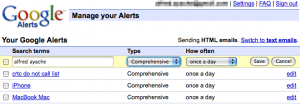Back in the old days, when I taught a community college course on programming, I learned the difference between data and information. Data is all around you. It doesn’t really help most of the time. Information, on the other hand, is the data distilled into a form you can actually use.
The Internet is full of data. Some of this data may even be information for certain people. The trick is hooking up a given individual with the data that’s information to him (yes, or her). And that’s the job of the search engines. OK, we’ve got that covered. But doing a search only gives us a snapshot of what’s out there at a given point in time. What happens if a couple of days later, something relevant and pertinent to our search gets posted online? To quote the immortal Bender: “We’re boned.”
This is where Google Alerts comes to the rescue. Alerts is a free service, allowing you to specify keywords you have a continuing interest in. It could be the company you work for, a gadget you’re interested in, an issue you want to keep an eye on, or your own name. (I know some out there consider Googling yourself tantamount to informational masturbation; but if some chucklehead is going to write something about me, I bloody well want to know about it.)
Alerts will perform the search on a continuing basis and email you the results regularly, based on your preferences (immediately, daily, or weekly).
My alerts include:
- my name
- the CRTC Do Not Call List (political issue)
- iPhone (gadget)
- MacBook (gadget)
- OLPC (gadget)
- Rogers and BitTorrent (political issue)
- PHP Zend MySQL LAMP (technologies I use for work)
- Tucows (the company I work for) 😉
Having used Alerts for a few months now, I can tell you this is the best tool I’ve found for staying abreast of the topics and issues that are important to me.
And now, a word of caution. Depending on the keywords in your alerts, you could easily end up with reams of links wafting their way to your inbox every day, and very quickly get overwhelmed with information. Oh, wait. No, it’s not information any more. That’s data.


